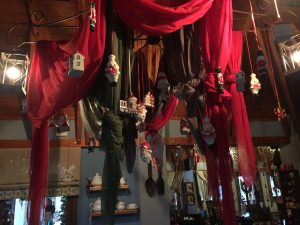
It’s Christmas Eve and I’ve just returned from Greece, where I spoke at the conference Politics of Space and the Humanities in Thessaloniki. It was my first encounter with that country, its citizens, and its ancient sites. My visit brought me face-to-face with ancient customs of hospitality in everyday life. Every city and village I visited was bedecked for the Christmas season, begat by an offer of accommodation in a stable because there was no place for Mary and Joseph at the inn.
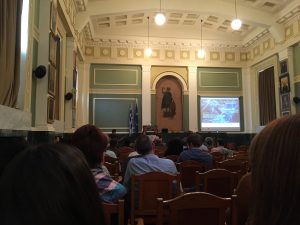
In Radical Hospitality, Lonni Collins Pratt and Daniel Homan insist that Hospitality has an inescapable moral dimension to it. It is not a mere social grace; it is a spiritual and ethical issue. It is an issue involving what it means to be human.
There is of course an older tradition of hospitality in ancient Greek culture. Early in The Odyssey, Telemachus sets sail to find news of his wandering father. Landing in Pylos with his crew, he is received warmly by King Nestor and his sons:
Nestor’s son Pisistratus, first to reach them,
grasped their hands and sat them down at the feast
on fleecy throws spread out along the sandbanks . . .
Only after Telemachus and his crew have had their fill does Nestor ask: “Strangers–friends, who are you?”
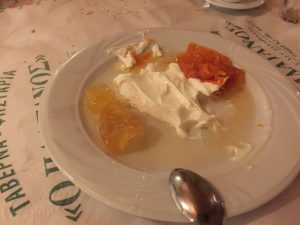
It is through the rituals and gestures of everyday life that such mythic acts of hospitality are made manifest. Hospitality is palpable in Greece. These are only some of the acts of welcome I will carry with me:
- * At Taverna Platanos in Ambelakia, the chef-host said the wine was on the house, knowing two of us had travelled far and seeing how we enjoyed our meal. He offered a dessert his mother had made of carrots, yogurt, and white pumpkin, telling us how it would please her if we ate it.
- * At the conference opening, students from Aristotle University offered a musical
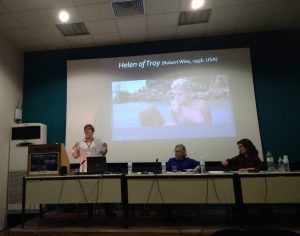
Panel 14, MB presenting interlude. The first keynote speaker, Yiorgos Kalogeras, told of being made welcome in my country during his Fulbright years, right after the Vietnam war. It is a manifestation of America that would be welcome at this time.
* At my panel, “Cinematic Topographies of Conflict in the Modern Imagination,” a young student approached us with water bottles: I’m your panel assistant. Is there anything else you need?
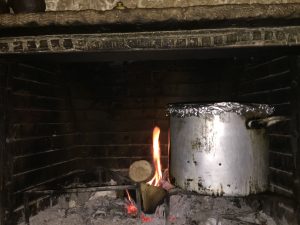
* In Ekeimeros restaurant in Neos Prodromos (near Vergina), the host insisted that we move to the best room, a heated balcony overlooking the fields that produced the vegetables. Knowing we were driving back to Thessaloniki, they offered us food that was ready: fresh cabbage salad, stuffed pepper and pastry, potatoes, horta, and wild boar that had simmered in wine over the fire. The mother, who did all the cooking, came out of the kitchen to greet us. She said the family did all the holiday decorations themselves, sharing their festivities.
* On a street near my apartment in Thessaloniki (where the hosts had placed a bowl of welcome fruit), someone made a cat shelter on a window ledge–offering food in the corner.
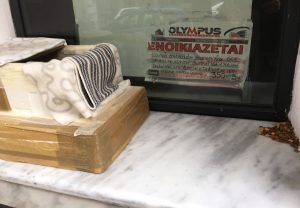
* On my last day in Greece, my Athenian host invited me to relax at her home as much as I would like: you are not a stranger in this house. She gave me pastries from her neighborhood bakery for my journey.
Such everyday acts of mythic resonance are transformative as we await the rebirth of a more hospitable world. –MB
References:
The New Oxford Annotated Bible. (Luke)
Lonni Collins Pratt and Daniel Homan, Radical Hospitality (2011).
Homer, The Odyssey, trans. Robert Fagles. (1996).